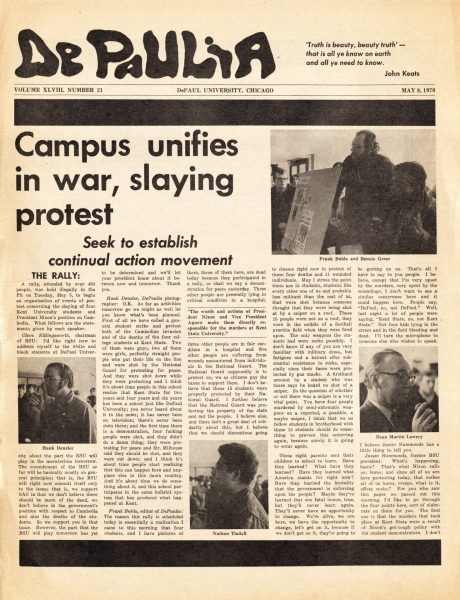Graduate students fight university for health insurance
Ph.D. students are fighting the university administration over access to health care, claiming the workload of teaching classes should warrant providing them equal benefits as other professors.
University of Chicago, Northwestern University and Loyola University all provide full health coverage for their Ph.D. students. DePaul offers a $1,500 stipend (after taxes, it’s more like $1,100) that is to be used for health insurance, but students say that isn’t enough for a decent plan. Also, a lot of Ph.D. students are over the age of 26, making them ineligible to stay on their parents’ plans.
Philosophy Ph.D. candidate Eric Aldieri said the coalition of students did the math, and it would only take 6 credit hours of their 100-plus students’ tuitions to pay for a basic health insurance plan for the whole year.
“$1,500 is just not enough to get any decent plan on the health insurance marketplace,” Aldieri said. “A good plan is about $3,000.”
The university maintains that budgetary issues such as health care are to be taken up with each individual college’s dean. The coalition of students requested a joint meeting with all three deans of the colleges that house Ph.D. programs and were denied, with no reason given for the denial, according to Aldieri. The deans of colleges that three Ph.D. programs at DePaul – philosophy, psychology and computer science – then allowed individual meetings with each of the deans, which are yet to take place.
The students’ group says the fight for Ph.D. health care dates back to 2010, but this is the first time students from all three colleges have banded together.
Graduate student Jennifer Gammage said that DePaul’s was the only Ph.D. program she was admitted to that doesn’t provide full health coverage.
“I don’t know of any other program in my field that doesn’t provide full health care from the time you are enrolled (in the Ph.D. program), even if you aren’t teaching classes right away,” Gammage said.
— Jennifer Gammage
Last year, Gammage had a cancer scare. With no health insurance, she had to take time off of teaching and her studies because she made just above the threshold to qualify for Medicaid so she could get treatment.
“It was very difficult,” Gammage said. “I had to live without income. Right now, I’m teaching three classes, and sometimes we’re only teaching one. That makes it hard to figure out what you qualify for, and it’s a lot of paperwork. There will be lapses in your coverage.”
Bilgesu Sisman, another philosophy Ph.D. candidate, was also hampered by her lack of medical coverage when she tore a ligament in her knee and now could face lasting damage from her injury because she treated it herself.
“Since I don’t have health care or the financial means to see a doctor on my own,” Sisman said. “It’s been five months and I still have pain in my knee. I don’t know what else to do but (look it up on the internet) and try to heal myself, which is not good.”
The students are wanting full coverage health insurance for the full duration of the time that they are teaching at the university, but they’ve been discouraged by the university’s response to their claims so far.
“I don’t know if it will ever happen,” Gammage said. “I’d like to see health care stipends that can actually pay for our care.”
“I just want the administration to take us seriously,” Sisman said. “This issue is not just going to drop.”
“The university is continuing to review this issue,” said university spokeswoman Carol Hughes.











